Prakriye Field Centre
Prakriye, our field resource centre, deploys the creative potential of information and communication technologies in furthering socio-political empowerment of marginalized rural women and adolescent girls, and promoting gender-responsive local governance. In its efforts to evolve a radically new development praxis that brings power to the peripheries, the centre engages with rural women’s collectives, adolescent girls, male community leaders, local government institutions and community based organizations in over 60 villages of Mysuru district, India.
Overview
The seven ICT-enabled information centres/Namma Mahiti Kendras that Prakriye runs in partnership with local women’s collectives in Hunsur and H.D.Kote blocks of Mysuru district continue to further a gender-responsive local governance culture at the grassroots in over 60 villages. Each information centre, operated by a woman infomediary from the local community (who is trained and mentored by the Prakriye team) enables marginalized women in the vicinity to access their rightful entitlements under various schemes and programs. The infomediary also supports women’s collectives in raising their issues in local governance forums through evidence-based claims-making. In addition, the centres also serve as the hubs of a participatory media-based learning culture, through which women and adolescent girls in the communities can further their agency, empowerment and leadership. This year, building on the pre-existing work of the information centres, we also initiated a new line of work on addressing gender-based violence in 25 villages in our operational area.
Namma Maathu, Namma Jaaga (Our discourse, our space): Building a community ecosystem to address gender-based violence
The new line of work that we initiated in 25 villages of H. D. Kote in March 2018 – with support from Edelgive Foundation – of building a supportive community ecosystem for prevention and redress of all forms of gender-based violence against women and girls, and enabling their access to justice, has taken off the ground successfully.
Gender help-desks managed by para-counselors from the local communities

In the project villages, we recruited a cadre of 51 para-counselors, selected from among anganwadi workers and leaders of sanghas (women’s collectives) from the local communities in consultation with local women stakeholders. We have built the capacities of this cohort in the essentials of feminist counseling and honed their understanding of how women’s rights are protected under various laws, with support from Samvada, a non-governmental organization with extensive experience in training barefoot counselors. Through 37 gender help desks – designated safe spaces in the local communities identified along with women’s collectives and elected representatives – the para-counselors now provide psycho-social support and referral services to women and girls who are grappling with violence. Between April 2018 to March 2019, over 913 women and girls in the project area have received support from the para-counselors in navigating a range of problems: street sexual harassment, sexual abuse within the family, alcoholism-related violence, dowry harassment, familial pressure on adolescent girls to enter into marriage and so on.
What makes the gender help desks and the para-counselors’ intervention stand out from mainstream institutional services is that, in addition to crisis support, they are also deeply engaged in furthering the empowerment journeys of local women’s collectives through monthly video-based learning dialogues. The para-counselors, with support from our field centre team and women infomediaries, utilize videos to catalyze critical reflections on gender roles, gender stereotyping, women’s rights in private and public realms, the importance of collectivization and solidarity and the need for gender-responsive local governance.
We have also started work on the following strategies to strengthen the para-counseling services:
- evolving a digital learning handbook with context-appropriate media material on counseling that can be pre-loaded on a tablet and distributed to each para-counselor as a ready reckoner;
- setting up a Whatsapp/mobile-based support network for para-counselors to reach out to women infomediaries and the Prakriye team for support in complex cases; and;
- developing a digital case management system that can be managed by para-counselors through their tablets, to track individual cases and pro-actively monitor women and girls at risk.
Media strategies to create a progressive discourse on gender in the local public sphere
The fight against gender-based violence is as much about norm-shift and creating a culture of zero-tolerance, as it is about providing redress and institutional support for victims. Proceeding from this starting point, we have devoted a lot of energies to creatively utilizing mobile-based Interactive Voice Response (IVR) technologies and participatory media to catalyze a vibrant dialogue in local communities on gender social norms, women’s rights and gender equality in the hope of breaking the silence around the naturalization of gender-based violence and women’s subordination.
Between April 2018 to March 2019, we broadcast 44 episodes of a mobile-based fiction serial Anjali Akka (Sister Anjali) to over 800 subscribers in H. D. Kote block. The serial revolves around the eponymous Anjali Akka (elder sister), characterized as a young woman from a village in the Mysuru region, who assumes an active leadership role in her community with respect to furthering the gender justice agenda. Each episode focuses on an issue that she intervenes in – successfully dissuading a couple from getting their underage daughter married, connecting a woman facing domestic abuse to crisis support services, intervening in a case of alcohol-related physical abuse etc. The choice of using a fictional format has been very useful with respect to opening up difficult conversations with community members.
With support from our infomediaries, we also organized 233 screenings of community video resources, covering 507 women, 799 adolescent boys and 771 adolescent girls in these 25 villages. There are numerous stories from the field on how the discussions following these screenings have enabled an interrogation of deep cultural norms. For example, in the village K (name withheld), where street sexual harassment is commonly reported, the field centre team organized a community screening for young men and boys, showing them videos made in partnership with adolescent girls in other project villages on the challenges they face with respect to negotiating their rights to mobility, participation and self-determination. About 60 men and boys were in the audience. Following the screening, the team opened up a conversation on the rights of women and girls in public and private spaces, and also carried out small group exercises. The girls from the village reported that following this intervention, there has been a visible change in the behavior of these men and boys in public spaces. Some boys and young men have also started affirming the importance of respecting the rights of women and girls in their conversations with friends, neighbors and family members.
Learning dialogues with adolescent girls and boys
Deep cultural change in gender norms and attitudes is possible only by working with adolescent girls and boys, who constitute the next generation of women and men. Having acknowledged this, in partnership with government schools in the local area, we have started capacity-building sessions on leadership, agency and empowerment with over 200 adolescent girls and sessions on gender justice and masculinities with over 200 boys. These sessions deploy many exciting pedagogies: photo essays, digital story telling, participatory video creation with training participants, role-play, simulation games and so on. In the design of the curricular material for adolescent boys, we also had inputs from students of the Srishti Institute of Art, Design and Technology, as part of their Reimagining Masculinities course project. Motivated by the discussions on the right to mobility and public participation in the learning dialogues, adolescent girls and boys of Jakkahalli petitioned their Gram Panchayat and the local bus depot manager and successfully got bus services sanctioned for their village. In addition, we have also initiated work with male youth, by engaging with them through existing sports clubs, fan clubs and other community-based organizations.
Building rapport with male community members and elected male representatives to obtain their support for local action against gender-based violence
Through one-on-one encounters, small group interactions, rapport-building exercises and various media strategies, we have involved over 215 male community leaders and elected male representatives in our efforts to put the gender-based violence prevention and redress agenda firmly on the local governance map. In two Gram Panchayats, elected male representatives have expressed a keen interest in reviving the Social Justice Committee and including action against violence as a key priority agenda in its functioning.
Women-owned information centres

Our ICT-enabled information centres continued their efforts at furthering marginalized women’s access to entitlements and socio-political empowerment of women’s collectives. Between April 2018-March 2019, the seven women infomediaries operating these centres collected information pertaining to over 260 welfare schemes, disseminating it to 12,000 women and men through village information visits, announcements in over 473 public forums/village meetings and mobile-based outreach. Over 253 welfare applications were processed on behalf of members of marginalized socio-economic groups. The infomediaries have also undertaken local level awareness campaigns on health and sanitation, and worked closely with government agencies in organizing regular health camps, nutrition day celebrations at the anganwadis and undertaking public audits of village infrastructure.
How the information centre helped Sannamma in accessing her old age pension
Sannamma is a tribal woman from V (name withheld), a village near the Bandipur forest range in Hunsur district. During one of her visits, the infomediary of the local information centre found Sannamma in tears. On inquiring into the reason for Sannamma’s distress, the infomediary found that she had no financial support from her family and was barely able to make ends meet. She had tried to obtain an old age pension through local middlemen, and had ended up losing 700 INR in the process. Subsequently, the infomediary accompanied Sannamma to the block office and helped her file her application for pension. However, her application was rejected on the grounds of lack of age proof, a document that had to be obtained from a medical officer.
Sannamma was scared to go to the hospital to complete this requirement as she had never visited any hospital till date. The infomediary repeatedly counseled her, helped her overcome her fear and accompanied her to the nearest primary health centre and got the required document. Her pension was then sanctioned by the authorities, and she now receives her pension regularly. Sannamma told our field team members, “I appreciate the commitment of the infomediary. It is good to have such young women leaders who work for the development of the community”.
Expanding circles of learning and influence
With support from Toolbox India, our field team members were able to undertake an exposure visit to Jan Sahas, a not-for-profit organization in central India committed to the development and protection of the rights of socially excluded communities, with a special focus on women and girls. Obtaining a first-hand look into the work of Jan Sahas in developing a cadre of barefoot lawyers to provide support in cases of gender-based violence helped us glean insights on how to strengthen the capacities of our para-counselling cadre. Subsequently, Prakriye hosted a learning visit for the Jan Sahas team members who were keen to learn more about participatory media and mobile-based IVR strategies. With support from Edelgive Foundation, Prakriye team members were also able to undertake learning visits to Majlis and Vacha, two Mumbai-based organizations with a long history of providing legal support services to victims of gender-based violence and adolescent girls’ empowerment respectively.

In February 2019, Anupama Suresh, Coordinator-Programs, Prakriye, and Susheela K.M., infomediary of the Naganahalli information centre, participated in the Dialogue with Madame Phumzile Mlambo-Ngcuka, UN Under-Secretary-General and Executive Director of UN Women, on accelerating women’s economic empowerment. The event was convened by the UN Women MCO for India, Bhutan, Maldives and Srilanka in New Delhi. Susheela K.M had an opportunity to share insights from her work on the transformatory social, economic and political impacts of access to information and communication technologies for rural women and girls. Read her reflections.
Impact
The para-counseling support system of locally operated gender help desks has received appreciation from the Principal Secretary, Department of Women and Child Development, Government of Karnataka for its potential for replication and scale. In the villages we work in, there is increasing recognition and acknowledgment of our work on prevention and redress of gender-based violence amongst critical stakeholders: elected local government bodies, line department officials, schools and community leaders. The women infomediaries have emerged as grassroots leaders in their own right and are being invited to lead social audit processes by line department authorities.
We are also being approached by other organizations working on gender-based violence in other parts of the country for support in appropriating digital strategies in their work. Our model has also received global attention, with our digital strategies being featured in a leading Canadian publication.
Plans for 2019-20
We will deepen our work in the area of addressing gender-based violence in the communities we work with: strengthening the capacities of our para-counseling cadre, utilizing a digitalized case management system for enhancing the interventions of our gender help desks and intensifying our efforts at building an alternative discourse on gender in the local public sphere through exhibitions of digital media artifacts created in partnership with adolescent girls and boys, gender score cards and participatory safety audits using GIS technologies. Our information centres and infomediaries who have emerged as young women leaders will continue to be hubs of a new culture of women’s active citizenship at the local level.
